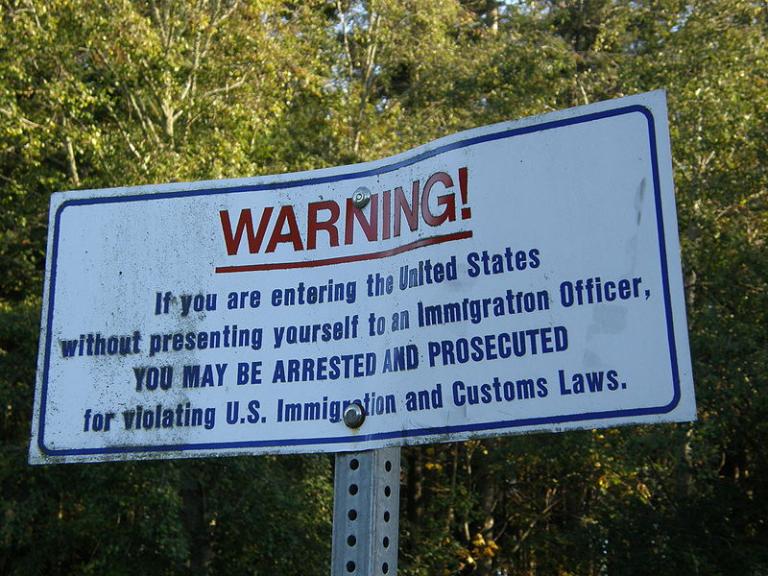
Today Cardinal Cupich had a piece in the op-ed section in the Chicago Tribune, titled “It’s immigrants who have made America great.”
Most of this is boilerplate: the so-called Dreamers were brought here through no fault of their own, and will make great contributions to this country, and it would be unjust for the government to deport them. As is now increasingly the case, Cupich deploys the rhetoric that they are already “Americans” in spirit, if not legally so. (Bernie Sanders even went so far as to label them as “undocumented Americans” on his website, as just another hyphenated group.)
Like all Americans, DACA enrollees want to contribute to our society. They strive as much as any American to be teachers, doctors, lawyers, firefighters, police officers, architects, computer scientists, engineers, members of the armed forces — and, yes, elected officials. But most of all they want to be Americans, officially. They want to help to build up the common good of the country they know, the nation they call home.
Now, mostly this rhetoric is just, well, rhetoric. Are immigrants, and illegal immigrants specifically, somehow morally superior to the rest of us? Do they carry within them a special desire to serve others, greater than that of the rest of us? Is the potential of a young illegal immigrant any greater than that of the average native-born American? If so, that does not mean there’s something special about immigrants, but says that there’s something seriously troubling about our own society, which we had better fix. But the reality is that this is cherry-picking the most talented of these kids and young adults, and ignoring the rest. (And don’t get me started on the throwaway lines about diversity being our strength. . . )
Cupich takes this a step further, though:
To remove DACA protections would put hundreds of thousands of young people at risk of deportation, cutting short their dreams of a better future. But that won’t be the only consequence of forcing these aspiring Americans out. Deport them, and we deport their potential to make our nation stronger. Deport them, and we deport our future builders of bridges, teachers of children, savers of lives.
Now, look, I get it: the U.S. government, for years upon years, made the choice not to enforce our immigration laws. Politicians proclaimed that illegal immigrants were welcome here, and treated the lack of legislation offering amnesty as more of a technicality, something that was on its way anyway. The American people might not have wanted this, but businesses were happy to be able to hire cheap workers, and left-wing politicians considered illegal immigrants a part of their constituency, so this became the status quo, and, as a result, it would genuinely be unjust to deport these individuals — at least those of them who have been in this country long enough to have integrated here, learning English, becoming a part of a wider community, and so on.
But to say that they are somehow better? To suggest that without them we cannot build bridges, teach our children, save lives? I just don’t think that Cupich is persuading anyone here.
(Oh, yes, I know, I’m just arguing against a strawman, Cupich doesn’t directly say that immigrants, and illegal immigrants, are better people than native-born Americans, but he implies it. If they are bridge-builders, and child-teachers, and life-savers in proportions equal to those of native-born Americans, what would be the benefit?)
It all gets to a bigger question, though: how much should our country grow? How many newcomers can we reasonably take in each year? How much can we spend in terms of all the services needed — foreign language instruction, other sorts of integration assistance, and social welfare benefits for unskilled workers? What proportion of newcomers is healthy, before we can no longer assimilate and integrate them? And how much growth from year to year is desirable in terms of the overall population, its impact on the environment, the economy, etc.? — Recall that the U.S. has a fertility rate that’s roughly at replacement level; it’s dipped below this over the past couple years but it’s generally believed to be temporary; this means that what we’re really talking about here is population growth that’s being driving entirely by immigration, and the fertility patterns of the new arrivals. According to Pew, the population is projected to grow from 324 to 441 million by 2065 (and, no, I haven’t dug into their assumptions and methodology). Is this too much, or too little, growth?
If this is too little, then the solution to illegal immigration is simple: throw open the borders. If this is too much, then we need to have a genuine discussion about what this number should be, then work backwards to what steps should be taken to get there.
And, in the end, what’s the purpose of allowing people to immigrate here? Is it to enhance our country? If that’s the case, then surely we should be more selective. Is it to provide opportunities, as a form of humanitarian aid? Then maybe we let in the poorest. But when do we stop, short of waiting for that equilibrium when the U.S. is no more wealthy and no less densely populated than any other country?
As a reminder, the issue at hand isn’t (entirely) a matter of illegal immigration. We could solve that issue instantaneously by simply providing green cards for everyone who wants one — but we don’t, and we won’t, because we know that there are limits. And once we have set those limits, we can’t say of illegal workers, “they should just have come legally” because a worker with no skills and no education and no family connections simply can’t come legally. Except for the green card lottery, here is no line for them to get into.
I’m not prescribing a right answer. But I am saying that we need to have this discussion.
Image from wikimedia commons.











